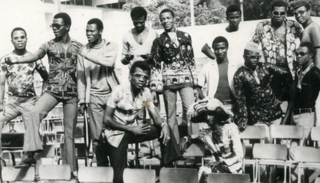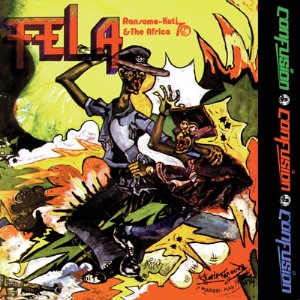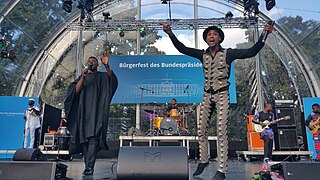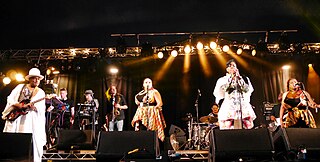Related Research Articles

Afrobeat is a Nigerian music genre that involves the combination of West African musical styles from mainly Nigeria such as the traditional Yoruba and Igbo music and highlife with American funk, jazz, and soul influences. With a focus on chanted vocals, complex intersecting rhythms, and percussion. The style was pioneered in the 1960s by Nigerian multi-instrumentalist and bandleader Fela Kuti, who is most known for popularizing the style both within and outside Nigeria. At the height of his popularity, he was referred to as one of Africa's most "challenging and charismatic music performers."
Given the vastness of the African continent, its music is diverse, with regions and nations having many distinct musical traditions. African music includes the genres amapiano, jùjú, fuji, afrobeat, highlife, Congolese rumba, soukous, ndombolo, makossa, kizomba, and others. African music also uses a large variety of instruments across the continent. The music and dance of the African diaspora, formed to varying degrees on African musical traditions, include American music like Dixieland jazz, blues, jazz, and many Caribbean genres, such as calypso and soca. Latin American music genres such as cumbia, salsa music, son cubano, rumba, conga, bomba, samba and zouk were founded on the music of enslaved Africans, and have in turn influenced African popular music.

The music of Nigeria includes many kinds of folk and popular music. Little of the country's music history prior to European contact has been preserved, although bronze carvings dating back to the 16th and 17th centuries have been found depicting musicians and their instruments. The country's most internationally renowned genres are Indigenous, Apala, Aurrebbe music, Rara music, Were music, Ogene, Fuji, Jùjú, Afrobeat, Afrobeats, Igbo highlife, Afro-juju, Waka, Igbo rap, Gospel, and Yo-pop. Styles of folk music are related to the over 250 ethnic groups in the country, each with their own techniques, instruments, and songs. The largest ethnic groups are the Igbo, Hausa and Yoruba. Traditional music from Nigeria and throughout Africa is often functional; in other words, it is performed to mark a ritual such as the wedding or funeral and not to achieve artistic goals. Although some Nigerians, especially children and the elderly, play instruments for their own amusement, solo performance is otherwise rare. Music is closely linked to agriculture, and there are restrictions on, for example, which instruments can be played during different parts of the planting season.

African-American music is a broad term covering a diverse range of musical genres largely developed by African Americans and their culture. Its origins are in musical forms that developed as a result of the enslavement of African Americans prior to the American Civil War. It has been said that "every genre that is born from America has black roots."

Osibisa are a Ghanaian-British Afro-rock band founded in London in the late 1960s by four expatriate West African and three London based Caribbean musicians.
Jùjú is a style of Yoruba popular music, derived from traditional Yoruba percussion. The name juju from the Yoruba word "juju" or "jiju" meaning "throwing" or "something being thrown". Juju music did not derive its name from juju, which is a form of magic and the use of magic objects, common in West Africa, Haiti, Cuba and other South American nations. It evolved in the 1900s in urban clubs across the countries, and was believed to have been created by Ababababaa Babatunde King, popularly known as Tunde King. The first jùjú recordings were by King and Ojoge Daniel in the 1920s, when King pioneered it. The lead and predominant instrument of jùjú is the Iya Ilu, talking drum.
Afro rock is a style of rock music with central African influences. Afro rock bands and artists in the late 1960s and early 1970s included Osibisa, Assagai and Lafayette Afro Rock Band.

Mellowosity is the debut studio album by Scottish Celtic fusion group Peatbog Faeries, released in 1996 on Greentrax Recordings. After forming as a vocal-based Celtic rock group in 1994, the duo had settled into becoming an instrumental Celtic fusion group by the release of Mellowosity. The album draws from a wide range of musical styles and influences including jazz, reggae, afrobeat, rock, Eastern music, dub and funk, that are mixed in with the band's traditional Scottish folk/Celtic sound featuring fiddles and bagpipes.

Chopteeth is a Washington, D.C.- based afrofunk big-band. Although rooted in Fela Kuti's Nigerian afrobeat, Chopteeth's music is an amalgam of Ghanaian highlife, Senegalese rumba, Jamaican ska, Mande griot music, 1970's West African funk, Ewe dance drum rhythms, Kenyan Taita afropop, soul-funk, and jazz. Chopteeth's writing and arrangements feature unique driving syncopations, and occasional odd meters. Chopteeth vocalists sing in eight different languages including English, Nigerian Pidgin, Swahili, Wolof, Mande, Twi, Taita, and French.

Orchestre Poly-Rythmo de Cotonou is a band from Cotonou, Benin, originally active from the 1960s to the 1980s and founded by singer-guitarist Mélomé Clément. They reformed in 2009 to international recognition. Their work has mixed styles such as funk, afrobeat, psychedelia, jazz and local voodoo influences. The Guardian called them "one of West Africa's best dance bands."

Confusion is a 1975 album by Nigerian Afrobeat musician Fela Kuti and his Africa 70 band. It was arranged, composed, and produced by Kuti, who recorded the album after choosing to emphasize his African heritage and nationalism in his music. Confusion is a commentary on the confused state of post-colonial Lagos and its lack of infrastructure and proper leadership at the time. Kuti's pidgin English lyrics depict difficult conditions in the city, including a frenetic, multilingual trading market and inextricable traffic jams in Lagos' major intersections.

Franck Biyong is a Cameroonian musician, bandleader and record producer. He plays the electric guitar, bass as well as percussion and keyboards. After a string of AfroJazz albums, Franck is breaking new ground with a genre called "Alternative Afro-Electro-Rock" or "Afrolectric Music" that fuses Rock, Electronica and African-flavoured beats. His music leans towards the new sound of Black Rock and Biyong is notable for his African "Guitar Hero" musical alternative and aesthetics.
MonoMono was an afro rock band formed in Lagos, Nigeria in 1971 by Sierra Leone-born Joni Haastrup, Babá Ken Okulolo, and Danjuma "Jimi Lee" Adamu. Other members included Friday Jumbo and Candido Obajimi. They produced a handful of singles and three full length LP's. "Monomono" is Yoruba for "lightning". Their music combined afropop, soul, and British rock, delivered in jam format.
Abiodun Odukoya, better known as Abiodun, is a Nigerian-German singer, songwriter, producer and music arranger. Abiodun's name is of Yoruba origin and means "he who is born on a day of festivity". He is better known as the co founder of the Afro German music collective Brothers Keepers and as one of the pioneers of the German reggae, afro and soul music scene.

Psychedelic funk is a music genre that combines funk music with elements of psychedelic rock. It was pioneered in the late 1960s and early 1970s by American acts like Sly and the Family Stone, Jimi Hendrix, and the Parliament-Funkadelic collective. It would influence subsequent styles including '70s jazz fusion and the '90s West Coast hip hop style G-funk.

Bantu is a 13-piece band based in Lagos, Nigeria. Their music is a fusion of Afrofunk, Afrobeat, highlife and Yoruba music. The group features multi-instrumentalists and singers who perform as a collective.

Ibibio Sound Machine is an English electronic afro-funk band from London. Formed in 2013, the band currently consists of vocalist Eno Williams, guitarist Alfred Kari Bannerman, percussionist Afla Sackey, drummer Joseph Amoako, bassist Philip PK Ambrose, trombonist/keyboardist Tony Hayden, trumpeter/keyboardist Scott Baylis and saxophonist/keyboardist Max Grunhard.
Afrobeats, is an umbrella term to describe popular music from West Africa and the diaspora is an umbrella term to describe popular music from West Africa and the diaspora that initially developed in Nigeria, Ghana, and the UK in the 2000s and 2010s. Afrobeats is less of a style per se, and more of a descriptor for the fusion of sounds flowing majorly out of Nigeria. Genres such as hiplife, jùjú music, highlife and naija beats, among others, were amalgamated under the "Afrobeats" umbrella.
Blo was a Nigerian psychedelic funk ensemble formed in Lagos and active between 1972 and 1982. The main trio consisted of Laolu "Akins" Akintobi (drums), Berkely "Ike" Jones (guitar), and Mike "Gbenga" Odumosu (bass). The group fused the Afrobeat rhythms of Nigeria with funk and psychedelia derived from '60s Western rock music.

Orlando Julius Aremu Olusanya Ekemode, known professionally as Orlando Julius or Orlando Julius Ekemode was a Nigerian saxophonist, singer, bandleader, and songwriter closely associated with afrobeat music.
References
- ↑ "afrobeat, afrofunk, afrojazz, afrorock, african boogie, african hiphop ...: The Funkees". Afrobeat-music.blogspot.com. 25 August 2009. Retrieved 2 September 2021.
- ↑ Bill Meyer (1 June 2012). "Dusted Reviews: The Funkees - Dancing Time". Archived from the original on 10 August 2019.
- ↑ "This is Africa, The Funkees - Dancing Time: The Best of Eastern Nigeria's Afro Rock Exponents". Archived from the original on 2 February 2014.
- ↑ Matthew Fiander (7 June 2012). "Pop Matters Review of Dancing Time".